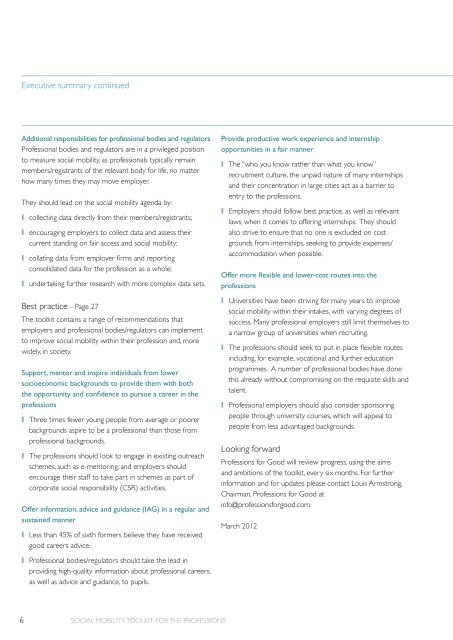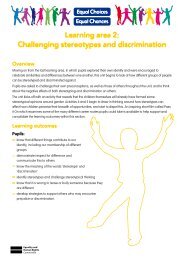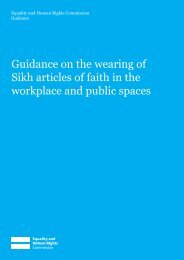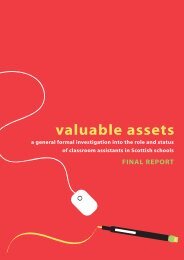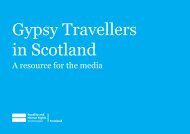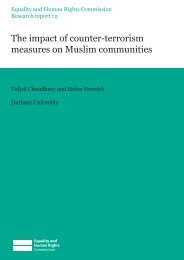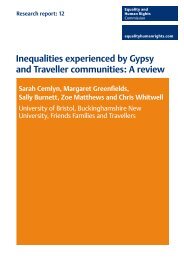Social Mobility Toolkit for the Professions - Equality and Human ...
Social Mobility Toolkit for the Professions - Equality and Human ...
Social Mobility Toolkit for the Professions - Equality and Human ...
You also want an ePaper? Increase the reach of your titles
YUMPU automatically turns print PDFs into web optimized ePapers that Google loves.
executive summary continued<br />
additional responsibilities <strong>for</strong> professional bodies <strong>and</strong> regulators<br />
professional bodies <strong>and</strong> regulators are in a privileged position<br />
to measure social mobility, as professionals typically remain<br />
members/registrants of <strong>the</strong> relevant body <strong>for</strong> life, no matter<br />
how many times <strong>the</strong>y may move employer.<br />
<strong>the</strong>y should lead on <strong>the</strong> social mobility agenda by:<br />
� collecting data directly from <strong>the</strong>ir members/registrants;<br />
� encouraging employers to collect data <strong>and</strong> assess <strong>the</strong>ir<br />
current st<strong>and</strong>ing on fair access <strong>and</strong> social mobility;<br />
� collating data from employer firms <strong>and</strong> reporting<br />
consolidated data <strong>for</strong> <strong>the</strong> profession as a whole;<br />
� undertaking fur<strong>the</strong>r research with more complex data sets.<br />
best practice – page 27<br />
<strong>the</strong> toolkit contains a range of recommendations that<br />
employers <strong>and</strong> professional bodies/regulators can implement<br />
to improve social mobility within <strong>the</strong>ir profession <strong>and</strong>, more<br />
widely, in society.<br />
Support, mentor <strong>and</strong> inspire individuals from lower<br />
socioeconomic backgrounds to provide <strong>the</strong>m with both<br />
<strong>the</strong> opportunity <strong>and</strong> confidence to pursue a career in <strong>the</strong><br />
professions<br />
� three times fewer young people from average or poorer<br />
backgrounds aspire to be a professional than those from<br />
professional backgrounds.<br />
� <strong>the</strong> professions should look to engage in existing outreach<br />
schemes, such as e-mentoring, <strong>and</strong> employers should<br />
encourage <strong>the</strong>ir staff to take part in schemes as part of<br />
corporate social responsibility (cSr) activities.<br />
Offer in<strong>for</strong>mation, advice <strong>and</strong> guidance (IaG) in a regular <strong>and</strong><br />
sustained manner<br />
� less than 45% of sixth <strong>for</strong>mers believe <strong>the</strong>y have received<br />
good careers advice.<br />
� professional bodies/regulators should take <strong>the</strong> lead in<br />
providing high-quality in<strong>for</strong>mation about professional careers,<br />
as well as advice <strong>and</strong> guidance, to pupils.<br />
6 <strong>Social</strong> <strong>Mobility</strong> toolkit For <strong>the</strong> proFeSSionS<br />
Provide productive work experience <strong>and</strong> internship<br />
opportunities in a fair manner<br />
� <strong>the</strong> “who you know ra<strong>the</strong>r than what you know”<br />
recruitment culture, <strong>the</strong> unpaid nature of many internships<br />
<strong>and</strong> <strong>the</strong>ir concentration in large cities act as a barrier to<br />
entry to <strong>the</strong> professions.<br />
� employers should follow best practice, as well as relevant<br />
laws, when it comes to offering internships. <strong>the</strong>y should<br />
also strive to ensure that no one is excluded on cost<br />
grounds from internships, seeking to provide expenses/<br />
accommodation when possible.<br />
Offer more flexible <strong>and</strong> lower-cost routes into <strong>the</strong><br />
professions<br />
� Universities have been striving <strong>for</strong> many years to improve<br />
social mobility within <strong>the</strong>ir intakes, with varying degrees of<br />
success. Many professional employers still limit <strong>the</strong>mselves to<br />
a narrow group of universities when recruiting.<br />
� <strong>the</strong> professions should seek to put in place flexible routes<br />
including, <strong>for</strong> example, vocational <strong>and</strong> fur<strong>the</strong>r education<br />
programmes. a number of professional bodies have done<br />
this already without compromising on <strong>the</strong> requisite skills <strong>and</strong><br />
talent.<br />
� professional employers should also consider sponsoring<br />
people through university courses, which will appeal to<br />
people from less advantaged backgrounds.<br />
looking <strong>for</strong>ward<br />
professions <strong>for</strong> Good will review progress, using <strong>the</strong> aims<br />
<strong>and</strong> ambitions of <strong>the</strong> toolkit, every six months. For fur<strong>the</strong>r<br />
in<strong>for</strong>mation <strong>and</strong> <strong>for</strong> updates please contact louis armstrong,<br />
chairman, professions <strong>for</strong> Good at<br />
info@professions<strong>for</strong>good.com.<br />
March 2012


